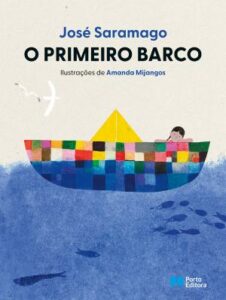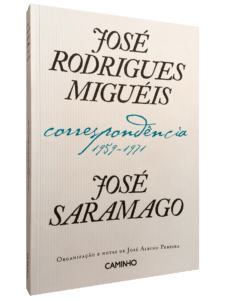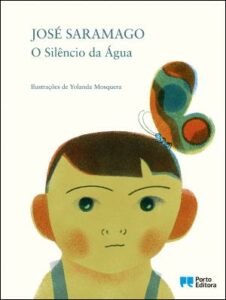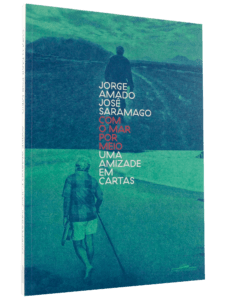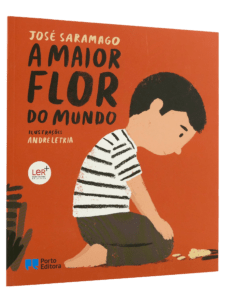This World and the Other
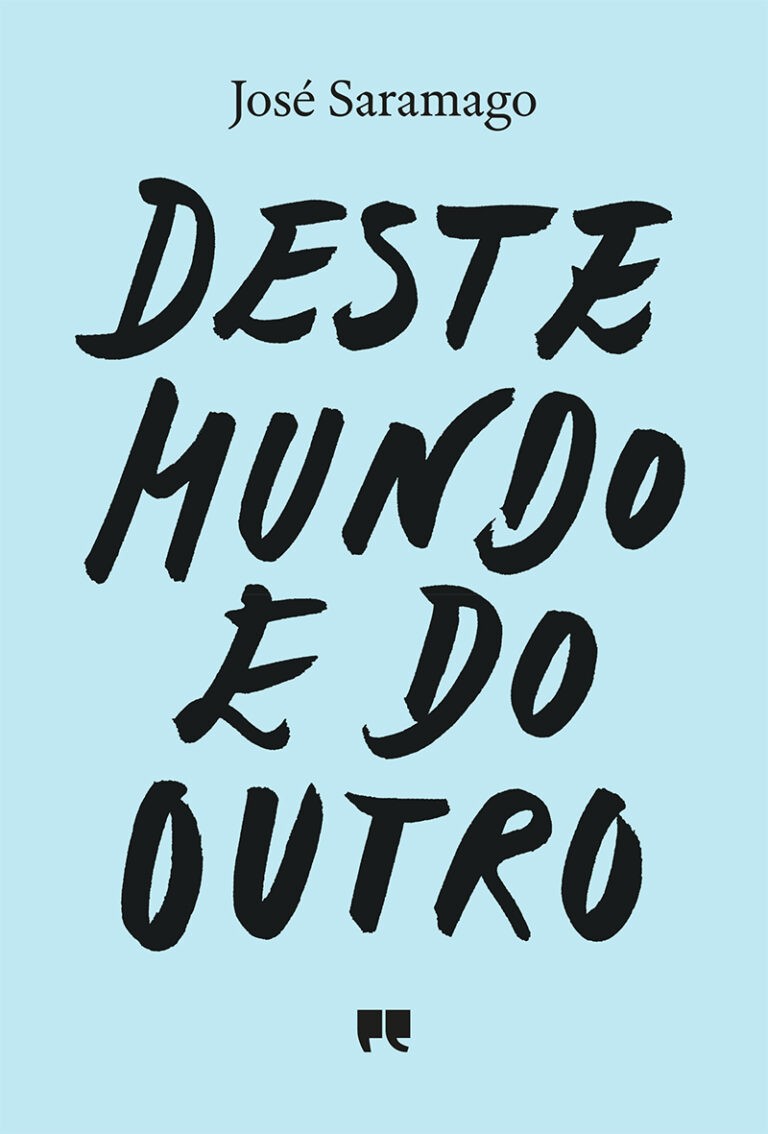
In those chronicles, one finds the embryo of almost everything that later grew and prospered… I see now that, unconsciously, I was already pointing myself towards the direction of my work from the late 70s onwards.
Foundation
Portugal
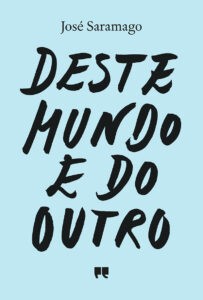
The calligraphy on the cover is by actress Maria de Medeiros.
Chronicles, what are they? Pretexts, or testimonies?
Chronicles Nobody Bathes Twice in the Same River, A Ilha Deserta, Um Encontro na Praia, and Os Navegadores Solitários included in the work Moby Dick in Lisbon.
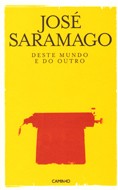
Editorial Path
1985, 8th ed., 2010
Language
Portuguese
Chronicles, what are they? Pretexts, or testimonies?
Chronicles Nobody Bathes Twice in the Same River, A Ilha Deserta, Um Encontro na Praia, and Os Navegadores Solitários included in the work Moby Dick in Lisbon.
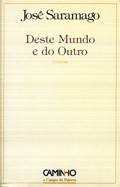
Editorial Path
1985, 8th ed., 2010
Language
Portuguese
Chronicles, what are they? Pretexts, or testimonies?
Chronicles Nobody Bathes Twice in the Same River, A Ilha Deserta, Um Encontro na Praia, and Os Navegadores Solitários included in the work Moby Dick in Lisbon.
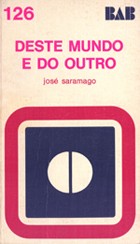
Arcadia Publishing House
1971 (Arcadia Pocket Library, No. 126) (1st edition)
Language
Portuguese
Arcadia Publishing House
1971 (Arcadia Pocket Library, No. 126) (1st edition)
Argentina
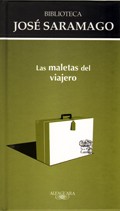
2010 (Trans.: Basilio Losada)(included in the work Las maletas del viajero)
Language
Spanish
Reads of free lyricisms and pretentious artifices, the 1998 Nobel Prize for Literature invites with this book to take the suitcases and travel with him, to explore the worlds that the City of José offers, which is not just his own experience as a vital writer and his moving vision of things.
If in his novels of great alienity José Saramago has revealed himself as a meticulous sculptor of words and atmospheres of high poetic charge, the collection of brief texts of De este mundo y del otro and Las maletas del viajero presents itself to us as a museum of fine orphebrery, in which the Portuguese author condenses his privileged capacity for observation and his delicate sensitivity, using a direct, intimate language, always close to that unknown friend who is the reader for him.
Saramago pleads for human fraternity and for the love of this garden that we cultivate among all men and women, and is called the world.
Spain
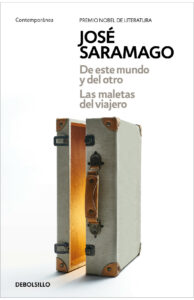
2022 (Trans.: Basilio Losada)(included in the work Las maletas del viajero)
Special Edition Commemorating the Centenary of José Saramago's Birth
Language
Spanish
All of the books grouped in this volume contain articles written in clear and direct language, in which reflection, observation and criticism of very diverse themes are combined.
From this world and the other is a series of brief chronicles about everyday life and its mysteries. In travel bags, Saramago talks about his childhood, his family, his experiences and political mistakes, as well as the life of cities, art and museums. In both cases, his prose demonstrates fine humor and irony that invites reading. The set allows us to glimpse a direct and close writer, who seems to dialogue with his readers in person.
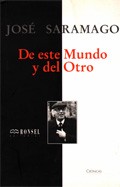
Ronsel
1993
Language
Spanish
Ronsel
1993
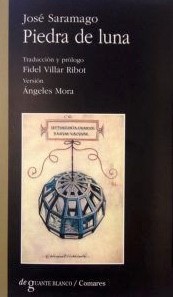
1999 (Translated by Fidel Villar Ribot) (included in the work Piedra de luna — 60 poems and 9 chronicles)
Language
Spanish
A selection of chronicles from This World and the Other: “The Words”, “The City”, “The Resistant Word”, “The Stone Eyes”, “The Gods Sell What They Give”, “My Grandfather, Too”, “Heart and Moon”, “A Leap in Time”, “Discourse Against Lyricism”.
Selection of poems from *Provavelmente Alegria*: “The poem is a granite cube”, “The first poem”, “Forge”, “Vow”, “The kiss”, “The words of love”, “I travel in your body”, “Where”, “White nights”, “The fruit”, “The silence is so deep”, “We walked on the waters”, “Blue water”, “Heart stone”, “Poem for Luís de Camões”, “On the island sometimes inhabited”, “It is a book of good faith”, “Madrigal”.
Selection of poems from The Possible Poems: “Ritual”, “The words are new”, “Question of words”, “Eloquence”, “Circus”, “Beach”, “Art of loving”, ”State of Nudity”, “Integral”, “Military exercise”, “Letter from José to José”, “To you I return, sea”, “To the gods without faithful”, “Speak for me, silence”, “Rule”, “Creation”, “In the silence of the eyes”, “We will not say mortal words”, “Clean hands”, “From me to the star”, “Sign of Scorpio”, “Declaration”, “Pride of D. João in Hell”, “Lament of D. João in Hell”, “Sarcasm of D. João in Hell”, “Romeo and Juliet”, “Juliet and Romeo”, “West side story”, “Don Quixote”, “Sancho”, “Dulcinea”, “Epitaph for Luís de Camões”, “I raise a rose”, "Fraternity," "Program," "Destiny," "Commonplace for a forty-year-old," "Poem with a closed mouth," "Psalm 136," "For time does not stop," "If I have no other voice," "Business.".
Italy
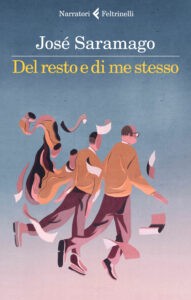
2018 (Translated by Giulia Lanciani) (in a volume with The Traveler's Baggage)
Language
Italian
In this world and elsewhere (Feltrinelli 2013) I wrote a part of the chronache script of José Saramago in 1968 and 1969 for publications in Lisbon “A Capital” and “Jornal do Fundão”. Le cronache sono, come è noto, il prima regolare esercizio della prosa del futuro Nobel: vi si può scorgere, in filigree, allo stato embryonale, quell'immenso tessuto finale dei romanzi, in cui la meravigliosa potenza dell'invenzione allows allo scrittore di sviluppare il design ardito of the story that communicates a new vision of the infinite richness and plurality of the world and the world. È in tale prospective che vanno lette quelle lontane cronache, in cui, come afferma lo stesso Saramago, “c'è già tutto”. It was worth it to continue, with the integration of that “story” not contemplated in that previous race, that straordinary adventure, that single journey, thin at the end, across the world of ricordi, that the author has a fissato sulla letter, “perché non si loss nulla di quei minuti d'oro, ore che splendono Come alone in the tumultuous and immense sky that is the memory.
GL.
A record of the unprecedented chronicle of the Nobel Prize for José Saramago's writing.
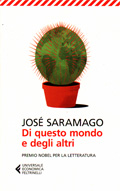
2013 (Translated by Giulia Lanciani) (in a volume with The Traveler's Baggage)
Language
Italian
“Di questo mondo e degli altri” raccoglie grande parte dei testi dei due libri di chronache scritte da José Saramago tra il 1968 e il 1969 per i giornali di Lisbona “A Capital” e “Jornal do Fundão”, e riuniti poi nei due volumi citati, pubblicati rispettividade in 1971 e nel 1973. Sono settantatré racconti that describes almost every episode of the real life seen by Saramago, in which the great Lusitanian writer alternates diverse narrative records. I feared spaziano dalle capable of the system and its great passion for gli animali and per l'ecologia; I didn't read illiterately and pastori di porci; la Rivoluzione dei garofani; l'impacciata foto dei genitori; lui stesso bambino scalzo; la nebbia del mattino; i contadini; il “mare portoghese”; l'arrotino; the person that poi diventeranno i suoi stessi personaggi… and, naturally, Lisbona and il Portogallo.
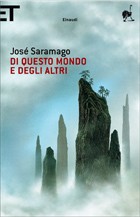
Einaudi
2006 (Translated by Giulia Lanciani) (in a volume with The Traveler's Baggage)
Language
Italian
Le piú belle «cronache» scritte da Saramago in an anthology prepared expressly for the Italian public: pensieri, racconti, illuminazioni, parabole…
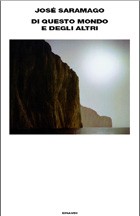
Einaudi
2006 (Translated by Giulia Lanciani) (in a volume with The Traveler's Baggage)
Language
Italian
Le piú belle «cronache» scritte da Saramago in an anthology prepared expressly for the Italian public: pensieri, racconti, illuminazioni, parabole…
Serbia
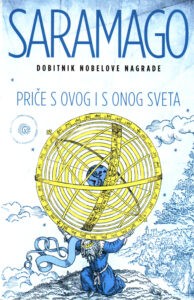
2013 (Translated by Jasmina Nešković) (included in the works Priče s ovog is onog sveta: “The Bridge”, “No One Bathes Twice in the Same River”, “Falling from the Sky”, “Winter Garden”, “Letter to Josefa, My Grandmother”, “My Grandfather, Too”, “The Apparition”, “The Words”, “The Desert Island”, “The Black Snow”, “The Stone Eyes” and “The Blind Man with the Harmonium”)
Language
Serbian
Šta se događa kada se stvari koje ljudi upotrebljavaju pobune protiv svojih korisnika?
Kako jedan car pokušao da izoluje smrt?
Kakva je sudbinavozača, praktično zarobljenih u svojim kolima?
Zašto strada poslednji kentaur koji je vekovima šumama struggle, bežeći od ljudi?
Ispitujući vlastite izražajne mogućnosti, Saramago se najpre okušao u kratkim formama – pripovetkama, kratkim pričama, parabolama… Sabrane u dve zbirke parabola Priče s ovog is onog sveta i Putnikov prtljag, jednu zbirku pripovedaka Tobožnji predmet i novelu Priča o nepoznatom ostrvu, njegove pripovesti svedoče o sporim ali sigurnim koracima kojima se pisoc približavao svojoj pravoj vokaciji – romanu. U ovoj knjizi njegovih izabranih priča čitalac će naći ne samo mnoštvo ideja koje će blink zaokupljati čitavog života, već i sve osnovne odlike jednog neponovljivog književnog rukopisa, toliko drugačijeg da ga je nemoguće oponašati.
„Velikan evropske književnosti iznosi nam u pričama svoj osoben pogled na uvad društvenih vrednosti, otuđenje i političku represiju, nudeći svoj odgovor na takve pojave: kada sve propadne, bend metaphora je najbolja alternative.“ Morning Star
„Ovde se majstor pera ogleda u kraćim, inventivnim proznim formama, i ishod je impresivan i lucidan. Saramagov dar iu pričama se neosporno ispoljio kao iu njegovim romanima.“ Publishers Weekly
